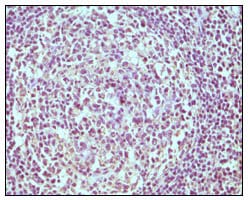
| WB | 咨询技术 | Human,Mouse,Rat |
| IF | 咨询技术 | Human,Mouse,Rat |
| IHC | 1/200 - 1/1000 | Human,Mouse,Rat |
| ICC | 技术咨询 | Human,Mouse,Rat |
| FCM | 咨询技术 | Human,Mouse,Rat |
| Elisa | 1/10000 | Human,Mouse,Rat |
| Aliases | B4; MGC12802 |
| Entrez GeneID | 930 |
| clone | 2E2B6B10 |
| Host/Isotype | Mouse IgG2b |
| Antibody Type | Primary antibody |
| Storage | Store at 4°C short term. Aliquot and store at -20°C long term. Avoid freeze/thaw cycles. |
| Species Reactivity | Human |
| Immunogen | Purified recombinant fragment of human CD19 expressed in E. Coli. |
| Formulation | Ascitic fluid containing 0.03% sodium azide. |
+ +
以下是关于CD19抗体的3-4篇关键文献的简要总结:
---
1. **文献名称**:*Chimeric Antigen Receptor T Cells for Sustained Remissions in Leukemia*
**作者**:Shannon L. Maude 等
**摘要**:该研究报道了靶向CD19的CAR-T细胞疗法(Tisagenlecleucel)在复发/难治性急性淋巴细胞白血病(ALL)中的临床试验结果,显示高达90%的完全缓解率,并探讨了其长期疗效及安全性问题。
---
2. **文献名称**:*Blinatumomab versus Chemotherapy for Advanced Acute Lymphoblastic Leukemia*
**作者**:Hagop Kantarjian 等
**摘要**:该临床试验验证了双特异性抗体Blinatumomab(靶向CD19和CD3)在成人复发/难治性ALL中的疗效,与化疗相比显著延长生存期,并激活T细胞介导的B细胞清除作用。
---
3. **文献名称**:*CD19: A Biomarker for B Cell Development, Lymphoma Diagnosis, and Therapy*
**作者**:Brad K. Sturgill 等
**摘要**:综述性文章,系统总结了CD19在B细胞发育、信号通路中的功能,以及作为B细胞恶性肿瘤(如非霍奇金淋巴瘤)治疗靶点的分子机制和临床转化进展。
---
4. **文献名称**:*Targeting CD19 in B-cell Malignancies: From Antibody Therapeutics to CAR-T Cells*
**作者**:Craig A. Portell 等
**摘要**:该文献对比了不同CD19靶向策略(如单克隆抗体、抗体偶联药物、CAR-T细胞)的作用机制和临床适应症,并讨论了耐药性及未来联合治疗方向。
---
这些文献覆盖了CD19抗体的基础机制、临床应用及前沿治疗技术,可为相关研究提供核心参考。
CD19 is a transmembrane protein predominantly expressed on the surface of B cells, serving as a critical regulator of B-cell receptor signaling and development. Discovered in the 1980s, it emerged as a pivotal therapeutic target due to its consistent expression across most B-cell malignancies, including acute lymphoblastic leukemia (ALL), chronic lymphocytic leukemia (CLL), and non-Hodgkin lymphomas, while being absent on hematopoietic stem cells, minimizing off-target effects.
CD19-directed antibodies exploit this specificity to treat B-cell disorders. Monoclonal antibodies like tafasitamab bind CD19 to directly inhibit B-cell proliferation or recruit immune cells for cytotoxicity. Bispecific antibodies (e.g., blinatumomab) engage both CD19 and CD3 on T cells, redirecting T-cell activity against malignant B cells. The most transformative application involves chimeric antigen receptor (CAR) T-cell therapy, where engineered T cells express CD19-targeting CARs, enabling potent anti-tumor responses. Approved CD19 CAR-T products, such as tisagenlecleucel and axicabtagene ciloleucel, achieve remarkable remission rates in refractory B-cell cancers.
However, CD19-targeting therapies face challenges, including antigen loss relapses and toxicities like cytokine release syndrome. Ongoing research focuses on combination strategies, next-generation CAR designs, and dual-targeting approaches to improve efficacy and safety. CD19 remains a cornerstone in immuno-oncology, illustrating the synergy between target biology and therapeutic innovation.
×